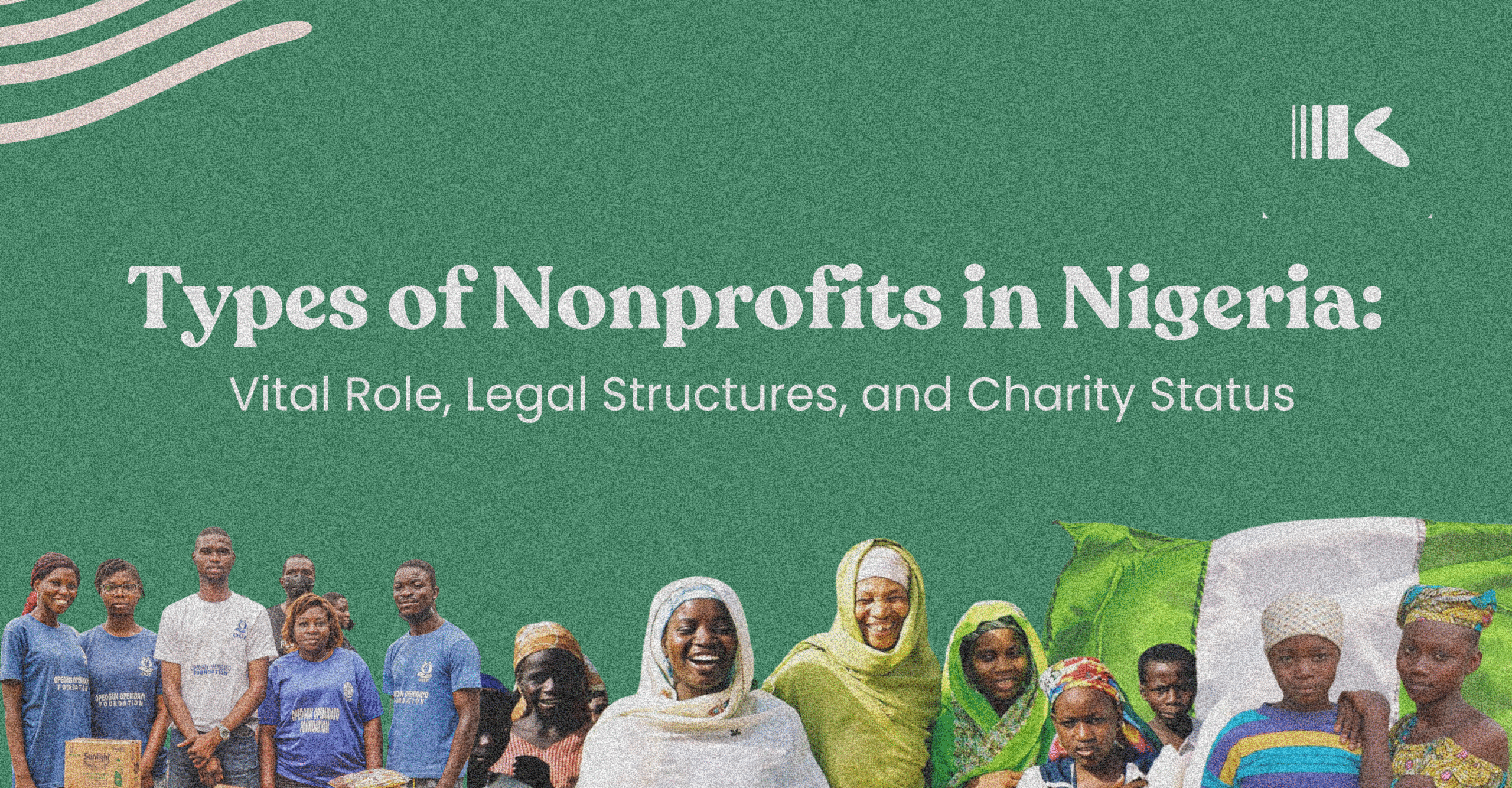Nonprofits play a vital role in the world, addressing social challenges, promoting community welfare, and fostering positive change. Their benefits are numerous, but not all of them are considered charities. To understand the different types of nonprofits, and how they differ from each other, and why not all qualify as charities, let’s break it down.
What Are Nonprofits (NPOs) in Nigeria?
Nonprofit organizations (NPOs) in Nigeria are entities dedicated to social, educational, religious, or developmental goals without distributing profits to owners. They are governed by the Companies and Allied Matters Act (CAMA 2020), which outlines two primary legal structures:
1. Associations with Incorporated Trustees
Nonprofits with incorporated trustees cannot distribute income or assets to members (e.g., dividends) but may pay employees fairly. Managing or governing members cannot receive salaries or fees for their roles, though they may be reimbursed for expenses or paid rent if the organization uses their property.
Once registered under Part C of CAMA 2020, these groups gain legal status i.e perpetual existence (operating indefinitely, even if trustees change) and the ability to sue/be sued. They are formed either by communities linked by custom, religion, kinship, or by groups created for specific purposes (e.g., charity, education) while the trustees act as a corporate entity after registration.
2. Companies Limited by Guarantee
A company limited by guarantee is a nonprofit created to support causes like charity, education, or culture. It can’t share profits with members and must use all money and property for its mission. If the company closes, leftover assets go to similar nonprofits and not members of the company. Members promise a small financial contribution (if needed) if the company can’t pay its debts. It has no shareholders and requires the approval of the Attorney General to register.
Some other categories of Nonprofits are that are not part of the primary legal structure but are also considered nonprofits:
3. Common Law Charitable Trust
A common law charitable trust in Nigeria is an informal, unregistered nonprofit created by a person during their lifetime (inter vivos) or through a will (testamentary). What this essentially is, is that a person can use their assets for charitable purposes under old English traditions and not specifically under Nigerian laws.
4. Unincorporated Association
An unincorporated association in Nigeria is an informal group people can form freely (under the Constitution, Sections 40 & 45) to pursue shared interests. It has no legal status as a separate entity and isn’t eligible for tax exemptions nor is it required to be registered. Foreigners can also form or join these groups.
Some notable mutually beneficial nonprofits:
- Cooperatives
- Community Based Organisations
- Religious Organisations
- Friendly societies
- Sports Clubs
- Youth Clubs
- Women’s Group
- Trade Unions these are specially regulated under separate laws
Quick Overview of the NPOs and Charities in the USA
In the USA, there are 27 types of nonprofit organizations (NPOs), each with clear distinctions in how they are categorized, legally defined, and granted tax-exempt status. All charities fall under the 501(c)(3) designation, which is reserved for organizations with religious, educational, scientific, or charitable purposes. These entities are fully tax-exempt, can receive tax-deductible donations.
Other NPO types serve distinct roles:
- 501(c)(4): Social welfare or advocacy groups (e.g., civic leagues) permitted limited political activity.
- 501(c)(6): Business leagues or chambers of commerce focused on industry improvement.
- 501(c)(7): Social/recreational clubs funded by member dues.
Tax exemption rules vary significantly across categories. For example, while 501(c)(3)s rely on public donations, charities under this type remain the most recognized, because they emphasize public benefit over private gain.
So Are All Nonprofits Considered Charities?
The short answer: No. Simply put, All charities are nonprofit, but not all nonprofit organizations are charities.
But in Nigeria most NPOs registered under CAMA have charitable status and they enjoy exemptions from income tax except to the extent that they receive any profit derived from trading or doing business. They can be considered charities
| Category | Nigeria | USA |
| Legal Framework | Governed by CAMA 2020. | 27 IRS-recognized types; charities under 501(c)(3). |
| Tax Exemptions & Funding | Limited exemptions, tax-deductible donations.. | 501(c)(3): Automatic exemption + tax-deductible donations. |
| Governance & Restrictions | Trustees cannot earn salaries; political activity prohibited | Salaries permitted for roles; 501(c)(3) bans politics, others allow lobbying. |
| Transparency & Public Trust | Minimal disclosure requirements. | Mandatory public financial filings (e.g., Form 990); high donor trust. |
Conclusion
While it is clear that both countries prioritize social good through nonprofits, Nigeria’s system is evidently less structured and more restrictive compared to the USA’s highly specialized, donor-friendly framework
The USA’s nonprofit ecosystem fosters innovation and public engagement through clear rules and incentives. Nigeria could strengthen its sector by streamlining registration, expanding tax benefits, and adopting tiered categories to better reflect diverse missions. Both systems, however, share a core focus of channeling resources toward societal betterment.



